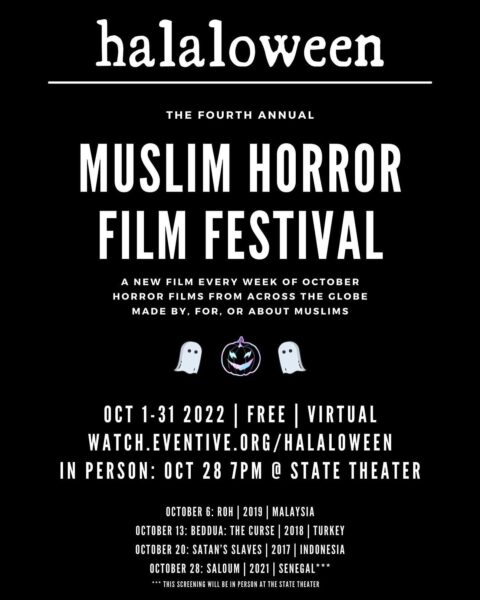Above: Aliyah Khan, director of the University of Michigan Center for Global Islamic Studies (photo courtesy Aliyah Khan)
October is great for celebrating all the spookiness leading up to Halloween—or rather, for Aliyah Khan, Halaloween.
Khan began leading the film festival with the pun-intended name back in 2021, a few months after she took on the role of directing the University of Michigan Center for Global Islamic Studies.
The festival, which officially began in fall 2019, was a way for the center to connect with students, staff, and local community members and to dive into the world of Muslim horror films. The nearby city of Dearborn is home to one of the largest Arab American communities in the U.S., with approximately 42% of its population of Arab descent.

Khan spoke at the Muslim Horror Film Festival 2022 event last October. (photo by Hana Mattar)
“The question we’re hoping to answer with these films and in giving Muslim filmmakers a platform is, can horror films be halal under Islamic law,” she said, referring to an Arabic word that translates as “permissible.”
Of the films shown throughout the festival’s four-year run, Khan says all are either made by Muslim filmmakers or set in Muslim-majority countries, and screened with the hope of understanding “What scares Muslim audiences? Are horror movies halal?”
The center’s program specialist, Hana Mattar, has been with the festival since its launch. Mattar coined the term “Halaloween” in partnership with former center director Karla Mallette—current chair of the Department of Middle East Studies—and the pair now works with Khan to find the best movies for the monthlong festival.
“Aliyah brought a lot of broadening and wanted to focus on different regions,” Mattar said. “We started to make different exceptions- let’s bring in films that are a little bit scary or considered thrillers, as opposed to typical horror movies.”
According to Khan, their collective film searches have found “way more horror movies in the Muslim world than anyone would think.” Some of 2022’s additions included Roh (2019, Malaysia), Satan’s Slaves (2017, Indonesia), and Beddua: The Curse (2018, Turkey).
 Because of COVID-19, the three brought the festival and other center programming online, which has since spread Halaloween to even farther-flung horror fans.
Because of COVID-19, the three brought the festival and other center programming online, which has since spread Halaloween to even farther-flung horror fans.
For the festival’s closing film, Saloum (2021, Senegal), they noted the in-person screening was sold out at Ann Arbor’s State Theatre.
As the festival transitioned to virtual offerings in 2020 and 2021 before its hybrid 2022 events, Khan said that it’s been a treat to have festivalgoers attend worldwide. The online platform also allowed for virtual panelists to join the conversation from abroad and for more media attention, including an NPR interview.
“It’s an interesting dialogue between people who are more familiar with the North American horror genre, and people who are fully situated somewhere else in the world,” she said.
While Khan has enjoyed Halloween’s increased popularity, she makes one thing clear: She was never a fan of horror films before the festival. But it’s been a joy to connect with Mattar and Mallette year-round to pick the best options for their spooky film festival.
“Now I think I know the genre really well, but it’s an interesting thing to get a non-horror-film buff to lead this,” she said with a laugh.

